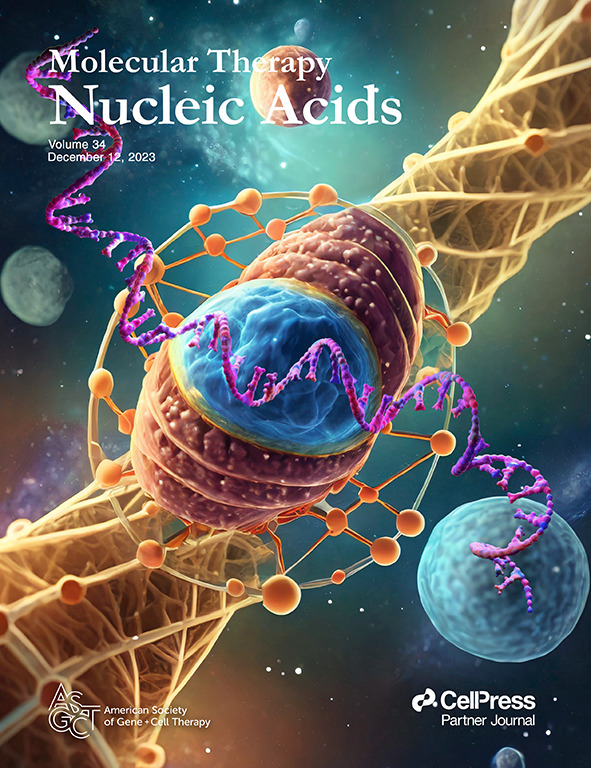等位基因特异性 CRISPR-Cas9 编辑技术使与胶原蛋白 VI 肌营养不良症相关的单核苷酸变异失活
IF 6.5
2区 医学
Q1 MEDICINE, RESEARCH & EXPERIMENTAL
引用次数: 0
摘要
应用等位基因特异性基因编辑工具可以扩大显性遗传病的治疗选择范围,既可以通过基因校正,也可以在单倍体缺陷可容忍的情况下通过等位基因失活。在这里,我们利用等位基因靶向 CRISPR-Cas9 引导 RNA(gRNA),在基因中的一个 SNV(c.868G>A;G290R)上引入了失活的移帧嵌合体,该变体为显性阴性,与一种严重的先天性肌营养不良症有关。我们在来自四名患者和一名对照组的原代成纤维细胞中表达了 SpCas9 和等位基因靶向 gRNA,但没有提供修复模板。对两种 gRNA 进行的扩增子深度测序显示,单核苷酸缺失占引入的吲哚的大部分。虽然两种 gRNA 在 G290R 等位基因上的活性较高,但在野生型等位基因上也有活性。为了提高等位基因的选择性,我们特意在一个 gRNA 中引入了额外的错配。其中一个经过优化的 gRNA 在 WT 等位基因上的活性极低,但在培养的患者成纤维细胞中却能产生富有成效的编辑并改善胶原 VI 基质。这项研究增强了基因编辑治疗显性阴性疾病的潜力,但也强调了利用 gRNA 实现等位基因选择性所面临的挑战。本文章由计算机程序翻译,如有差异,请以英文原文为准。
Allele-specific CRISPR-Cas9 editing inactivates a single nucleotide variant associated with collagen VI muscular dystrophy
The application of allele-specific gene editing tools can expand the therapeutic options for dominant genetic conditions, either via gene correction or via allelic gene inactivation in situations where haploinsufficiency is tolerated. Here, we used allele-targeted CRISPR-Cas9 guide RNAs (gRNAs) to introduce inactivating frameshifting indels at an SNV in the gene (c.868G>A; G290R), a variant that acts as dominant negative and that is associated with a severe form of congenital muscular dystrophy. We expressed SpCas9 along with allele-targeted gRNAs, without providing a repair template, in primary fibroblasts derived from four patients and one control subject. Amplicon deep sequencing for two gRNAs tested showed that single-nucleotide deletions accounted for the majority of indels introduced. While activity of the two gRNAs was greater at the G290R allele, both gRNAs were also active at the wild-type allele. To enhance allele selectivity, we introduced deliberate additional mismatches to one gRNA. One of these optimized gRNAs showed minimal activity at the WT allele, while generating productive edits and improving collagen VI matrix in cultured patient fibroblasts. This study strengthens the potential of gene editing to treat dominant-negative disorders, but also underscores the challenges in achieving allele selectivity with gRNAs.
求助全文
通过发布文献求助,成功后即可免费获取论文全文。
去求助
来源期刊

Molecular Therapy. Nucleic Acids
MEDICINE, RESEARCH & EXPERIMENTAL-
CiteScore
15.40
自引率
1.10%
发文量
336
审稿时长
20 weeks
期刊介绍:
Molecular Therapy Nucleic Acids is an international, open-access journal that publishes high-quality research in nucleic-acid-based therapeutics to treat and correct genetic and acquired diseases. It is the official journal of the American Society of Gene & Cell Therapy and is built upon the success of Molecular Therapy. The journal focuses on gene- and oligonucleotide-based therapies and publishes peer-reviewed research, reviews, and commentaries. Its impact factor for 2022 is 8.8. The subject areas covered include the development of therapeutics based on nucleic acids and their derivatives, vector development for RNA-based therapeutics delivery, utilization of gene-modifying agents like Zn finger nucleases and triplex-forming oligonucleotides, pre-clinical target validation, safety and efficacy studies, and clinical trials.
 求助内容:
求助内容: 应助结果提醒方式:
应助结果提醒方式:


